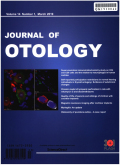- 钛学术文献服务平台 \
- 学术期刊 \
- 医药卫生期刊 \
- 五官科学期刊 \
- 中华耳科学杂志(英文版)期刊 \
Congenital hypothyroidism as a risk factor for hearing and parents' knowledge about its impact on hearing
Congenital hypothyroidism as a risk factor for hearing and parents' knowledge about its impact on hearing
基本信息来源于合作网站,原文需代理用户跳转至来源网站获取
摘要:
Aim: To evaluate the hearing of children with congenital hypothyroidism (CH) and to analyze the knowledge that parents' have on the possible auditory impacts of the disease. Methods: A total of 263 parents/guardians were interviewed about aspects of CH and hearing. Audio-logical evaluation was performed on 80 participants, divided into two groups: with CH (n= 50) and without CH (n=30). Clinical and laboratory CH data were obtained from medical records, pure tone auditory thresholds and acoustic reflexes were analyzed. The auditory data was compared between groups. Student's t-test and Chi-square were used for statistical analysis at a significance level of 5% (p≤0.05). Results: The majority (78%), of the parents were unaware that CH when not treated early is a potential risk to hearing. There was no correlation between socioeconomic class and level of information about CH and hearing (p>0,05;p=0.026). There was a statistically significant difference between the auditory tone thresholds of the groups and between the levels of intensity necessary for the triggering of the acoustic reflex. The group with CH presented the worst results (p≤0.05) and absence of acoustic reflex in a normal tympanometric condition. Conclusions: Children with CH are more likely to develop damage to the auditory system involving retrocochlear structures when compared to healthy children, and that the disease may have been a risk factor for functional deficits without deteriorating hearing sensitivity. The possible impacts of CH on hearing, when not treated early, should be more publicized among the parents/guardians of this population.

推荐文章
Mercury speciation, bioavailability and risk assessment on soil–rice systems from a watershed impact
Mercury and methylmercury
Rice
Mercury speciation and bioavailability
Paddy soil
Risk assessment
Ecological risk assessment of surficial sediment by heavy metals from a submerged archaeology harbor
Heavy metals
Eastern harbor
Enrichment factors
Degree of contamination
Potential ecological risk
中文简版Spatial Hearing Questionnaire的信效度分析
声源定位
Spatial Hearing Questionnaire
信效度分析
耳聋
内容分析
关键词云
关键词热度
相关文献总数
(/次)
(/年)
文献信息
| 篇名 | Congenital hypothyroidism as a risk factor for hearing and parents' knowledge about its impact on hearing | ||
| 来源期刊 | 中华耳科学杂志(英文版) | 学科 | |
| 关键词 | |||
| 年,卷(期) | 2021,(2) | 所属期刊栏目 | Research Articles |
| 研究方向 | 页码范围 | 71-79 | |
| 页数 | 9页 | 分类号 | |
| 字数 | 语种 | 英文 | |
| DOI | |||
五维指标
引文网络
引文网络
二级参考文献 (0)
共引文献 (0)
参考文献 (26)
节点文献
引证文献 (0)
同被引文献 (0)
二级引证文献 (0)
1983(1)
- 参考文献(1)
- 二级参考文献(0)
1986(1)
- 参考文献(1)
- 二级参考文献(0)
1996(2)
- 参考文献(2)
- 二级参考文献(0)
2000(1)
- 参考文献(1)
- 二级参考文献(0)
2002(2)
- 参考文献(2)
- 二级参考文献(0)
2003(1)
- 参考文献(1)
- 二级参考文献(0)
2004(1)
- 参考文献(1)
- 二级参考文献(0)
2006(2)
- 参考文献(2)
- 二级参考文献(0)
2007(1)
- 参考文献(1)
- 二级参考文献(0)
2011(1)
- 参考文献(1)
- 二级参考文献(0)
2012(1)
- 参考文献(1)
- 二级参考文献(0)
2013(3)
- 参考文献(3)
- 二级参考文献(0)
2014(1)
- 参考文献(1)
- 二级参考文献(0)
2015(4)
- 参考文献(4)
- 二级参考文献(0)
2017(2)
- 参考文献(2)
- 二级参考文献(0)
2018(2)
- 参考文献(2)
- 二级参考文献(0)
2021(0)
- 参考文献(0)
- 二级参考文献(0)
- 引证文献(0)
- 二级引证文献(0)
引文网络交叉学科
相关学者/机构
期刊影响力
中华耳科学杂志(英文版)
主办单位:
解放军总医院耳鼻咽喉科研究所
出版周期:
季刊
ISSN:
1672-2930
CN:
11-4883/R
开本:
出版地:
北京市复兴路28号
邮发代号:
创刊时间:
语种:
eng
出版文献量(篇)
450
总下载数(次)
0
总被引数(次)
399
期刊文献
相关文献
推荐文献
- 期刊分类
- 期刊(年)
- 期刊(期)
- 期刊推荐

 免费查重
免费查重










